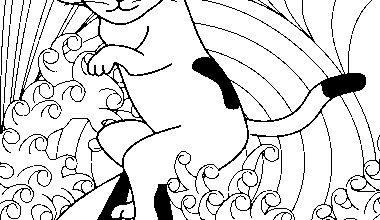The Role of Humor and Joy in Maintaining Mental Health for Cat Rescuers
Cat rescuers play a vital role in ensuring the well-being of felines, but caring for them can also take a toll on one’s mental health. The emotional strain of rescuing and rehabilitating animals is often underestimated. Cat rescuers frequently deal with heartbreaking situations and persistent challenges, such as medical treatments, placement, and even loss. It is crucial for these individuals to find ways to cope with the emotional weight of their responsibilities. One effective method for maintaining mental health is to incorporate humor and joy, which can provide necessary relief amidst troubling situations. Humor can catalyze resilience, lightening the load of stressful experiences and giving perspective. Joy, meanwhile, is essential for overall well-being and vitality. By fostering an environment where laughter is encouraged, cat rescuers can create a more positive atmosphere both for themselves and the animals they care for. Simple moments of joy, such as playful interactions with cats, can offer a refreshing break from daily distress. In this article, we explore how humor and joy play a crucial role in supporting the mental health of those dedicated to cat rescue.
Understanding the Impact of Laughter
Laughter has a significant impact on mental health, acting as a natural stress reliever. When a person laughs, their body releases endorphins, which are chemicals that promote a sense of well-being and happiness. For cat rescuers, laughter can serve as an important tool to combat the challenges they face regularly. Engaging in laughter not only improves mood but also strengthens social bonds among fellow rescuers. Working in a team can help alleviate feelings of isolation or burnout, especially when the work becomes overwhelming. Sharing funny stories about the cats they rescue can create a light-hearted atmosphere, encouraging teamwork and emotional support among individuals. Group activities or informal gatherings centered around the theme of humor can greatly enhance camaraderie, making every member feel valued and appreciated. Moreover, even being playful with the cats they care for can lead to amusing experiences that provide joy. Creating opportunities for humor in everyday situations can lead to decreased anxiety and promote a more positive attitude. The more laughter and lightness are integrated into their routine, the more resilient these rescuers can become against the difficulties they encounter during their missions.
Incorporating effective practices into the daily routine helps cat rescuers manage mental health. By identifying moments of joy in their work, they can shift focus from negativity to more fulfilling experiences. Keeping a gratitude journal, for example, can encourage individuals to reflect on their weekly successes, whether big or small. Acknowledging those moments can create a sense of accomplishment and positive reinforcement, leading to improved overall well-being. Additionally, engaging in activities that spark joy—like taking care of kittens or encouraging playful interactions—can provide mental respite. Also, practicing self-care in the form of leisure activities or hobbies outside of rescue work is essential. Such practices extend beyond humor and involve nurturing one’s own passions and interests, leading to a more balanced life. It’s crucial for cat rescuers to embrace downtime, cultivating interests that enhance joy and mental clarity. Connecting with family or friends for support offers an additional emotional outlet. Understanding the importance of laughter and joyful interactions not only enhances the atmosphere of the rescue environment but also rejuvenates the spirit of the rescuers, allowing them to keep pursuing their noble missions with renewed vigor.
Creating a Support Network
Building a reliable support network is essential for cat rescuers working to maintain mental health. Rescuing animals can at times feel isolating, especially when faced with distressing situations. Reach out to other cat rescuers or animal welfare groups for support. Connecting with peers who understand the challenges can foster a sense of camaraderie. Mental health support groups or rescue organization meet-ups can provide a space for sharing experiences, resources, and coping strategies. Engaging in discussions about emotional resilience and humor within rescue work can help lighten the burden felt by many rescuers. This network of support can act as a safety net, creating opportunities for shared laughter, which is crucial in coping with stress. Moreover, maintaining an open line of communication is essential for emotional support. Encouraging friends, family, or fellow rescuers to share funny moments or anecdotes can create an environment rich in positivity. This positive reinforcement can go a long way in combating feelings of burnout and discouragement that often accompany rescue work, reminding rescuers of the joy that lies at the heart of their mission.
Mindfulness practices can also contribute to improved mental health for cat rescuers. Techniques such as meditation, deep breathing, and yoga can foster a sense of peace and well-being. These practices allow individuals to take a step back from the chaos often associated with animal rescue and refocus their energies. Mindfulness encourages cat rescuers to be present in the moment, helping them manage their thoughts and emotions effectively. Integrating mindfulness can help reduce anxiety and stress levels, providing clarity amidst challenging circumstances. Experimenting with different mindfulness techniques may yield the best results; thus, flexibility is essential. When life gets overwhelmingly serious, incorporating laughter and joy into these practices can prove beneficial. Join a class or practice at home to combine movement with humor, whether through playful stretches or laughter yoga. This blend of mindfulness and joy can create a powerful foundation for improving overall mental health. Recognizing the positive effects of laughter amplifies the benefits of these practices, making them even more enjoyable and meaningful. Ultimately, establishing a strong connection with oneself is needed to face the emotional demands of rescue work.
Celebrating Small Victories
Recognizing and celebrating small victories can make a substantial difference in the mental health of cat rescuers. Every rescue presents unique challenges, yet each success, no matter how small, contributes to the overall mission of animal welfare. Whether it’s successfully nursing a sick cat back to health or finding a forever home for an adoptable feline, acknowledging these moments helps reinforce motivation. Creating an environment where these successes are celebrated fosters positivity among fellow rescuers. Organizing team celebrations for every milestone can strengthen connections and create memorable experiences outside the typical stress involved in their work. Such celebrations do not need to be extravagant; even a simple gathering with some snacks and the sharing of stories can go a long way in uplift spirits. Those little moments of joy can remind rescuers why they chose this path in the first place. It fosters a community spirit and reaffirms the collective commitment to animal welfare, which translates into better mental health outcomes. Thus, by recognizing achievements and focusing on the good, cat rescuers can fortify their resilience against emotional challenges encountered on their journey.
Leaning into the power of storytelling allows cat rescuers to share experiences without holding back. Stories have an extraordinary ability to connect individuals and evoke a sense of understanding. By sharing humorous anecdotes or uplifting tales from the field, rescuers can help bridge emotional gaps and foster a supportive environment. Additionally, storytelling can be therapeutic; recounting moments can mitigate pain while also creating bonds between rescuers. Engaging in story-sharing sessions, whether in community forums or online groups, can cultivate a sense of belonging and shared purpose. Learning from one another through storytelling can enable growth and learning, encouraging others to seek joy amidst difficult times. Doing so offers a space for catharsis, as rescuers recount heartwarming or funny stories involving their cat rescue experiences. Alongside laughter, these narratives serve as powerful reminders of the underlying passion behind rescuing animals. This intrinsic motivation keeps the spirit alive for cat rescuers, kindling a shared commitment towards making a difference. It, therefore, reflects the essence of community support and reinvigorates the love behind their dedicated work in cat rescue.
Conclusion: The Importance of Joy in Rescue Work
In conclusion, maintaining mental health through humor and joy is essential for anyone involved in cat rescue. The challenges faced by rescuers can take a toll, but by incorporating laughter, supportive networks, and mindful practices, they can better equip themselves to handle the emotional demands of the job. Celebrating successes, sharing stories, and fostering a positive environment creates a sense of purpose and fulfillment. Ultimately, joyful experiences not only uplift rescuers but also enhance the lives of the cats they save. Embracing humor in everyday work allows rescuers to counterbalance the stresses they face while fostering mental resilience. Cat rescue isn’t merely about the animals; it’s also about caring for oneself and one’s community. When cat rescuers prioritize joy, they cultivate an enduring passion for their work and can better provide care for the animals that need it. Incorporating moments of happiness and humor can lead to a more sustainable and rewarding experience in rescue work. As rescuers nurture their own mental health, they are more effective advocates for the cats they cherish, creating a ripple effect of positive change in the world around them.


